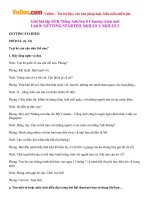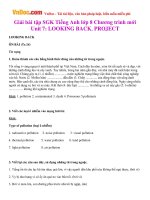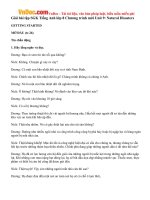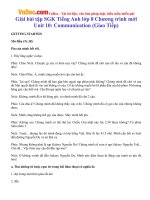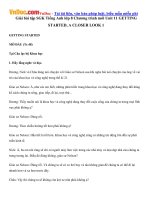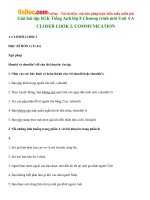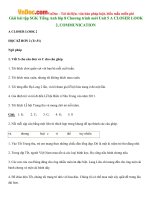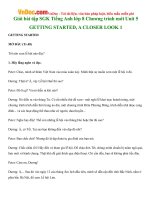BÀI TẬP LUYỆN TIẾNG ANH LỚP 8 CHƯƠNG TRÌNH MỚI: UNIT 7 POLLUTION
Bạn đang xem bản rút gọn của tài liệu. Xem và tải ngay bản đầy đủ của tài liệu tại đây (80.4 KB, 5 trang )
UNIT 07: POLLUTION
I.
Match each type of pollution with its definition.
Types of polution
Definitions
1. Air polluion
A. The increase of temperature caused by human activity.
B. The contamination of any body of water such as lakes,
2. Land pollution
groundwater, oceans, etc.
C. The contamination of air by smoke and harmful gases.
3. Light pollution
D. The release of unwanted radioactive material into the
environment.
4. Noise pollution
E. The brightening of the night sky preventing us from seeing
stars by improper lighting of communities.
5. Thermal pollution
F. The destruction of the earth’s surface caused by the misuse of
resources or improper dumping of waste.
6. Visual pollution
G. Anything unattractive or visually damaging to the nearby
7. Water pollution
landscape.
H. Any loud sounds that are either harmful or annoying to
8. Radioactive pollution
humans and animals.
II.
Find the word which has a different sound in the part underlined.
1. A. algal
B. aquatic
C. contaminate
D. permanent
2. A. thermal
B. thankful
C. there
D. through
3. A. pollution
B. earplug
C. dump
D. dust
4. A. untreated
B. measure
C. please
D. bread
5. A. physical
B. visual
C. music
D. because
6. A. recycle
B. medical
C. chemical
D. athletic
7. A. pollute
8. A. into
B. botanic
C. contaminate
D. economy
9. A. emission
B. history
C. tiny
D. disease
10. A. ocean
B. electricity
C. economy
D. energy
B. factory
C. contaminate
D. occur
III.
Find the word which has a different position of the main stress in each line.
1. A. affect
B. pollute
C. effect
D. litter
2. A. cholera
B. pollutant
C. permanent
D. groundwater
3. A. radiation
B. political
C. historical
D. contaminant
4. A. seriously
B. measurement
C. scientific
D. logical
5. A. aquatic
B. historic
C. physical
D. botanical
6. A. medical
7. A. physical
B. hospital
C. politic
D. electric
8. A. scientific
B. horrific
C. beautiful
D. defferent
9. A. national
B. dramatic
C. athletic
D. domestic
10. A. prehistoric
B. chemical
C. medical
D. informal
B. economic
C. linguistic
D.optimistic
IV.
Choose the word whose main stress is placed differently from the others.
1. A. limit
B. pollution
C. influence
D. dirty
2. A. exist
B. destroy
C. human
D. result
3. A. decrease
B. urgent
C. serious
D. national
4. A. weather
B. rapid
C. action
D. affect
5. A. rubbish
B. become
C. government
D. nature
6. A. national
7. A. athletic
B. grammatical
C. medical
D. chemical
8. A. scientifically
B. historic
C. dramatic
D. classic
9. A. contaminate
B. economic
C. artistic
D. scientific
10. A. environment
11. A. animal
12. A. aware
13. A. pollutant
14. A. groundwater
15. A. artificial
B. present
C. continue
D. poison
B. atmosphere
C. factory
D. temperature
B. pollution
C. energy
D. chemical
B. disposal
C. scientific
D. protect
B. contaminant
C. permanent
D. environment
B. illumination
C. radioactive
D. contamination
B. pesticide
C. herbicide
D. billboard
V.
Complete the sentences. Put the verbs in brackets into the first conditional sentence.
1. The bell ………………….(ring) if there ……………… (be) a fire.
2. The bike ………………..(break) if all three of you ………………(get) on it.
3. If you ………………….(not learn) how to use a computer, it …………….(be) hard to find a job.
4. We …………………(also cut) down the amount of pollution we create if we …………(cut) down
the use of fussil fuels.
5. If we ………………….(reuse) things, this …………………(minimize) the dependence of making
new things.
6. We …………………(reduce) noise pollution if we ………………(grow) more tress since they
absorb sound.
7. If we …………….(recycle) glass, we ………………..(reduce) air pollution by 20 percent.
8. You ………………..(save) 40 watt- hours a day if you …………….(turn) off your computer before
bedtime.
9. If you ………………..(hear) loud noise too often, you………………….(have) hearing lost.
10. I …………………(have) no money left if I ………………..(buy) that expensive book.
VI.
Rewrite the following sentences.
1. She comes late again. She loses her job.
If ..............................................................................................
2.
I win this competition. I give the award to the unlucky people.
If ........................................................................................................................................................
3. I don’t see you tomorrow. I call you up.
If ..............................................................................................
4. The weather is good tomorrow. We go swimming.
If ..............................................................................
5. It rains. She stays at home and watches TV.
If .......................................................................................
6. Mrs. Ha wants to get a lot money. She must work harder.
If ......................................................................................................................................................
7. Work hard or you can’t pass the exam.
If ............................................................................................
8. Practise speaking every day or you can’t improve your English.
If .................................................................................................................................................
9. Keep your neighborhood clean and you will have an ideal place to live.
If .................................................................................................................................................
10. Promise to try harder or I won’t help you.
If .......................................................................................
11. Go out more often or you will fall ill. If .......................................................................................
12. Keep your feet dry or you will get a cold.
If .......................................................................................
13. Unless he works harder, he’ll lose his job.
If .................................................................................................................................................
14. Unless he changes his way of living, he’ll meet a lot of troubles.
If .................................................................................................................................................
15. She won’t open the door if she doen’t know who it is.
Unless ............................................................................................................................................
16. If she doesn’t hurry, she will miss the last train.
Unless ......................................................................
17. If you don’t take care of those shoes, they won’t last for long. (look)
Unless ……………………………………, those shoes won’t last for long.
18. You can improve your English by practicing speaking every day.
If ..........................................................................................................................................................
19. Study hard or you will fail the coming exam.
If …………………………………………………………………………………………………….
20. I’ll call the police if you don’t leave me alone.
Unless ……………………………………………………………………………………………….
VII. Complete the sentences. Put the verbs in brackets into the second conditional sentence.
1. If my grandfather ………….(be) stiil alive, he ………………….(to be) a hundred today.
2. I ……………………(offer) to give you a lift if I ……………..(have) my car here.
3. Where you …………….(choose) if you could live anywhere in the world?
4. If you …………………(drive) from London to Glassgrow, which way would you go?
5. If I …………………(live) out of town, I …………………..(take) up the garden.
6. We …………………(not have) any money if we …………………….(not work)
7. I ………………….(not mind) living inEngland if the weather ……………….(be) better.
8. If I ……………….(be) you, I …………………..(not wait), I ……………….(go) now.
9. If we ……………..(have) more reliable cars, we ………………(drive) to Spain rather than fly.
10. If Mr. Morgan …………………..(be) still head teacher, he ……………..(not permit) such bad
behaviour.
VIII. Put the verbs in bracket into the correct form to complete the sentences.
1. If the local people drink the contaminated water, they …………………(have) healthproblems.
2. If there were more trees in this areas, the air ………………….(be) fresher.
3. All the aquatic animals ………………..(die) if people don’t stop dumping sewage into the lake.
4. Global warming ………………..…………(not happen) if there weren’t too much carbon dioxide in
the atmosphere.
5. If the sun ………………(shin), we will walk to the mountain.
6. If people ………………(stop) digging the street, there wouldn’t be noise pollution in this area.
7. People use a lot of cars and motorcycles. If people ……………..(reduce) the use of motor vehicles,
there ………………………(be) less serious air pollution.
8. If you ………………..(not read) these articles, you ………………….(not know) the facts about
water pollution.
9. If I ……………..(be) the president, I ………………..(remove) all the factories out of the city.
10. Your brother …………………..(have) hearing problem if he …………….(listen) too loud music.
IX.
Read the passage and answer the questions.
Land pollution is another term for soil contamination (for example, by factory chemicals or sewage
and other wastewater). It means any kind of long- term land damage, destruction, degradation or loss.
Air and water pollution disappear, but land pollution doesn’t. It stays exactly where it is. Radiation
can contaminate land for thousands of years. That means radioactive waste dumps remain that way
indefinitely.
The biggest problem comes when contaminated land returned to use as buildings or agriculture land.
People might get their water from rivers. Diseases might happen over years for this reason.
We should try to find a way of stopping or reducing land pollution. We should recycle old things to
reduce our need for new ones. Also, we need to clean up many contaminated sites.
1. What’s another term for land pollution?
…………………………………………………………………………………………………………..
2. What causes land pollution?
…………………………………………………………………………………………………………..
3. Is long- term land damage a form of land pollution?
…………………………………………………………………………………………………………..
4. How long can radiation contaminate land?
…………………………………………………………………………………………………………..
5. When does the biggest problem happen?
…………………………………………………………………………………………………………..
6. What should we try to find?
…………………………………………………………………………………………………………..
7. Why should we recycle old things?
…………………………………………………………………………………………………………..
8. What do we need to do?
…………………………………………………………………………………………………………..
X.
Read the passage carefully, then decide whether the following statement are true or false.
Every day on radio, on TV, and in the newspapers, we hear, see, or read about many problems in the
world, for example, pollution problems.
Air pollution is the first kind. It mostly comes from released from motorbikes, cars, airplanes, trains, and
poisonous gases emitted from factories. Also, waste is dumped anywhere, even in the city where many
people are living.
The second pollution problem is sea pollution. Many people earn their living from fish in the sea, and
the fish they catch feed many people. But the sea has become so polluted from oil spills, and factory
wastes that the fish are dying. This pollution is not only killing the fish, but is also affecting those people
who eat fish.
Seldom do you find a place nowadays that is not polluted. This problem is growing more difficult
every day. We must find a good solution that makes the world a better place to live.
1.
2.
3.
4.
5.
6.
Statements
Environmental pollution is one of the world’s problems.
Vehicles and factories account for air pollution
Waste is usually dumped in the city where many people are living
The sea water is heavily contaminated by oil spills and industrial sewage.
A lot of fish aredying because of marine pollution
Pollution has been reduced to the minumum nowadays.
True
False
II.
1. D
2. C
3. A
4. A
5. B
6. A
7. D
8. C
9. D
10. A
III.
1. D
2. B
3. A
4. C
5. C
6. D
7. B
8. A
9. D
10. C
2. C
12. C
3. A
13. C
4. D
14. A
5. B
15. A
6. B
7. D
8. C
9. D
10. A
IV.
1. B
11. B
V.
1. will ring – is
2. will break - get
3. don’t learn – will be
4. will also cut – cut
5. reuse - willminimize
6. will reduce – grow
7. recycle – will reduce
8. will save – turn
9. hear – will have
10. have- buy
VI.
1. was / were– would be
2. would offer – had
3. did you choose
4. drove / were driving
5. lived – would take
6. wouldn’t have - didn’t work
7. wouldn’t mind – were/ was
8. were – wouldn’t wait – would go
9. had- would drive
10. was/ were – wouldn’t permit
1. will have
2. would be
3. will die
4. wouldn’t happen
5. shines
6. stopped
7. reduced – would be
8. don’t read – won’t know
9. were – would remove
10. will have - listens
VII.
VIII.
1. Soil contamination.
2. Factory chemicals or sewage and other wastewater.
3. Yes, it is.
4. For thousands of years.
5. When contaminated land is returned to use as buildings or agriculture land.
6. A way of stopping or reducing land pollution.
7. To reduce our need for new ones.
8. We need to clean up many contaminated sites.
IX.
1. T
2. T
3. F
4. T
5.T
6. F
